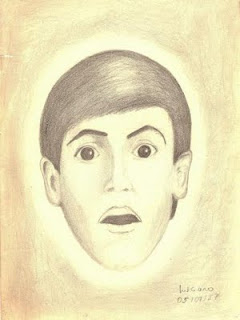 Robert Bunter: So, we’ve arrived at the Esher demos. Perhaps a word of explanation is in order, for readers who don’t know very much about the Beatles. After returning home from their spiritual explorations in India in 1968, the Beatles set about the task of preparing to record The Beatles, which you may know as the White Album. They gently tripped their way over to George’s psychedelically-painted bungalow in Esher, got out the old Brunnell three-speed reel-to-reel tape recorders and acoustic guitars, and recorded a series of astonishing bare-bones song sketches. There was probably a bowl of fruit nearby … I’m picturing tapestries hanging from the walls, joss sticks burning, and most likely they were seated on purple cushions on the floor. Their colorful, flowing garments were outrageous.
Robert Bunter: So, we’ve arrived at the Esher demos. Perhaps a word of explanation is in order, for readers who don’t know very much about the Beatles. After returning home from their spiritual explorations in India in 1968, the Beatles set about the task of preparing to record The Beatles, which you may know as the White Album. They gently tripped their way over to George’s psychedelically-painted bungalow in Esher, got out the old Brunnell three-speed reel-to-reel tape recorders and acoustic guitars, and recorded a series of astonishing bare-bones song sketches. There was probably a bowl of fruit nearby … I’m picturing tapestries hanging from the walls, joss sticks burning, and most likely they were seated on purple cushions on the floor. Their colorful, flowing garments were outrageous.
Richard Furnstein: "I'm Just A Child Of Nature" is undoubtedly the most significant "outtake" from the Esher sessions. It certainly buries George's "Circles" and "Sour Milk Sea" (although, to be fair, SMS was later significantly improved by yowling soulster Jackie Lomax). You may recognize the melody as "Jealous Guy" from Lennon's Imagine album (and, if you do, congratulations for being aware of one of the most beautiful recordings in galaxy history). Here, Lennon is more concerned with trumpeting his advancing hippie man skills. Paul was strutting around Rishikesh in fragrant white gowns, proclaiming to Prudence Farrow that he was Mother Nature's Son. While Prudence was no Mia in the bone zone department, John couldn't let this peacockery stand so he came up with the ridiculous moniker Child of Nature. And there you have it: these mentally stunted adults couldn't just meditate in an affluent retreat in the land of elephants and okra, they had to arm wrestle and beat their chests like common sub-apes.
The solo years would allow John to revisit the song's lovely melody, this time as a testament to his unhealthy insecurities surrounding his Japanese wife.
Robert Bunter: John had returned from India with a clutch of wonderful new songs and a bad case of the Yokos. This diminutive Japanese concept artist (still living in London at the time) was haunting his dreams and interrupting his thoughts during his deepest meditations. He probably imagined her creepy little-girl voice chiming in with a bunch of inscrutable riddles and kindergarten mysticism. There he was, chanting in his humble hut, when all of a sudden, it’s: “John! John … it’s me Yoko … John … it’s me … if a tree falls and no one hears it, does it make a sound? … what if they gave a war and nobody came? … John … things are more like they are now than they ever were before … John, John” until he’s half-mad. So, he takes a walk down to the stream and writes “I'm Just A Child Of Nature.”
Richard Furnstein: There is speculation that Lennon abandoned "I'm Just A..." because Paul had delivered the superior hippie kid anthem in "Mother Nature's Son." I'm sure this played a large role in the decision making of the increasingly petty and paranoid John Lennon. I would offer that the twinkling sentiments of the song didn't wear well back in grimey England. The Beatles probably returned from the misty mountains of India and had to face a generation of filthy, drug-swallowing deviants with loose hygienic standards and uneven facial hair. Lennon could probably see that his lovely snapshot of his easy breezy time in India would later be co-opted by these gross inferior creatures (imagine the "I'm Just A Child Of Nature" Lennon posters hanging in freshman dorm rooms!) and decided to shelve it. The solo years would allow John to revisit the song's lovely melody, this time as a testament to his unhealthy insecurities surrounding his Japanese wife.
Robert Bunter: I think this is the quintessential Lennon melody. If you stripped away all the layers of shifting identities and listened to the deepest part of his soul, this is what you’d hear. The gentle tune is pretty and memorable, yet the mood is darkened by weird, discordant moments (like the chord on the word “free” in the chorus) which somehow heighten the shimmering beauty instead of breaking the spell.
















